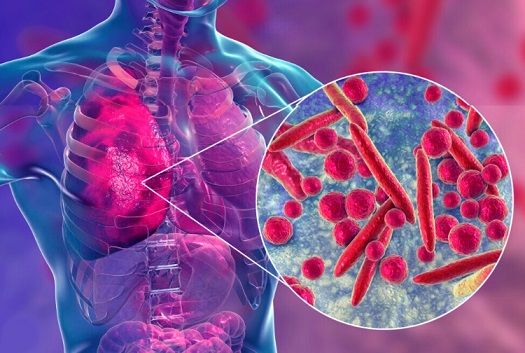Nikhil Prasad Fact checked by:Thailand Medical News Team Jan 13, 2025 3 months, 8 hours, 54 minutes ago
Medical News: Mycoplasma pneumoniae is a notorious bacterial pathogen responsible for community-acquired respiratory infections. It often affects children and young adults, leading to illnesses ranging from mild tracheobronchitis to severe pneumonia. This bacterium is highly adept at spreading through respiratory droplets, making it particularly prevalent in densely populated areas with limited ventilation. The bacterium’s ability to adhere to the respiratory epithelium is critical for infection, as it uses specialized proteins to attach to host cells and begin colonization.
 Marine Glycans and Their Role in Combating Mycoplasma Pneumoniae
Marine Glycans and Their Role in Combating Mycoplasma Pneumoniae
Infections caused by Mycoplasma pneumoniae are further complicated by its ability to evade the immune system. During the COVID-19 pandemic, cases of Mycoplasma pneumoniae declined due to non-pharmaceutical interventions, such as social distancing and improved hygiene. However, the resurgence of infections, along with the emergence of antibiotic-resistant strains, underscores the urgent need for innovative therapeutic strategies. This
Medical News report focuses on an intriguing study that explores how marine-derived sulfated glycans can inhibit the bacterial adhesion process, offering new hope in the fight against these infections.
The Role of Adhesion Proteins and Heparin
The primary mechanism of Mycoplasma pneumoniae involves its adhesion proteins, P1 and P30, which enable it to bind to host cell receptors. These receptors, often sialylated and sulfated glycosaminoglycans (GAGs), play a critical role in facilitating bacterial adherence. Among these GAGs, heparan sulfate (HS) is a major player in host-pathogen interactions. Heparin, a structurally similar compound, is frequently used as a model for studying these interactions.
Researchers have long sought ways to disrupt this critical adhesion process, as it could prevent infection at its earliest stages. Natural compounds, especially those derived from marine organisms, have emerged as promising candidates due to their unique structural properties.
Exploring Marine Sulfated Glycans
Marine environments are rich in diverse organisms that produce unique glycans with extraordinary biological activities. These sulfated glycans, such as fucans and fucosylated chondroitin sulfates, exhibit distinct sulfation patterns and molecular structures not commonly found in terrestrial sources. Marine sulfated glycans have already demonstrated potential in anticoagulant, antitumor, and antiviral therapies.
In the study, researchers from Nankai University in China, Rensselaer Polytechnic Institute in the United States, and the University of Mississippi collaborated to evaluate the efficacy of marine-derived sulfated glycans in disrupting the interactions between Mycoplasma pneumoniae adhesion proteins and heparin. This multidisciplinary team’s expertise in microbiology, chemistry, and biochemistry provided a comprehensive approach to tackling this challenge.
Key Findings from the Study
The stud
y employed Surface Plasmon Resonance (SPR) spectroscopy to analyze the interactions between Mycoplasma pneumoniae adhesion proteins and various glycans. The glycan library included heparin, its oligosaccharides, and a range of marine-derived sulfated glycans. The key findings are summarized below:
-Binding Affinity of Adhesion Proteins:
The P1 and P30 proteins exhibited significant binding affinity to heparin, with equilibrium dissociation constants (KD) of 16.4 nM and 80.3 nM, respectively. This confirmed the strong interaction between these proteins and heparin.
-Inhibitory Potential of Marine Glycans:
Marine sulfated glycans showed a remarkable ability to inhibit the interaction between the adhesion proteins and heparin. Glycans derived from the sea cucumber Isostichopus badionotus, specifically IbSF and IbFucCS, demonstrated significant inhibitory effects. When desulfated, these compounds showed a reduced capacity to inhibit binding, highlighting the critical role of sulfation.
-Diverse Efficacy Among Glycans:
Sulfated glycans from other marine organisms, such as Holothuria floridana and Lytechinus variegatus, also displayed potent inhibitory activity. For instance, PpFucCS (from Pentacta pygmaea) achieved 94% inhibition of P30 binding and 100% inhibition of P1 binding.
Interestingly, the specific sulfation patterns of these glycans appeared to influence their inhibitory potential more than the overall degree of sulfation.
Dose-Dependent Inhibition:
The inhibitory effect of these glycans was dose-dependent. For example, PpFucCS showed an IC50 value of just 7.0 ng/mL, indicating its high potency in preventing bacterial adhesion.
Implications for Therapeutic Development
These findings underscore the therapeutic promise of marine sulfated glycans as anti-adhesion agents. By targeting the early stages of infection, these compounds could serve as a novel class of antimicrobial agents with a mechanism distinct from traditional antibiotics. This is particularly important in addressing antibiotic-resistant strains of Mycoplasma pneumoniae.
The study also highlights the potential of using structural modifications to enhance the efficacy of these glycans. For instance, tailoring the sulfation patterns of these compounds could optimize their ability to block bacterial adhesion, paving the way for highly targeted therapies.
Conclusions and Future Directions
The study demonstrates that marine-derived sulfated glycans are potent inhibitors of Mycoplasma pneumoniae adhesion proteins. These natural compounds disrupt the critical interaction between the bacterium and host cells, thereby preventing colonization and subsequent infection. The key findings reveal that the sulfation pattern of these glycans plays a pivotal role in their inhibitory potential.
Looking ahead, further research is needed to:
-Elucidate the precise structure-activity relationships of these glycans.
-Evaluate their bioavailability and safety in vivo.
-Develop scalable methods for their extraction and production.
The potential for these glycans to serve as a new class of antimicrobial agents is immense. By leveraging the unique properties of marine-derived compounds, researchers can address the growing challenge of antibiotic resistance while exploring new frontiers in infectious disease treatment.
The study findings were published in the peer-reviewed journal: Marine Drugs.
https://www.mdpi.com/1660-3397/22/5/232
For the latest on Mycoplasma Pneumoniae, keep on logging to Thailand
Medical News.
Read Also:
https://www.thailandmedical.news/news/mycoplasma-pneumoniae-kukoamine-a-from-cortex-lycii-radices-improves-infections-by-regulating-mir-222-3p-superoxide-dismutase-2
https://www.thailandmedical.news/news/mycoplasma-pneumoniae-bakuchiol-from-psoralea-corylifolia-reduces-the-severity-of-mycoplasma-pneumoniae-induced-pneumonia
https://www.thailandmedical.news/news/mycoplasma-pneumonia-flavonoids-of-camellia-oleifera-prevents-lung-injury-in-white-lungs-via-inhibition-of-tlr2-mediated-nf-%CE%BAb-and-mapk-pathways
https://www.thailandmedical.news/news/new-rsv-strain-in-china-infecting-children-with-existing-sars-cov-2-impaired-innate-immunity,-paving-the-way-for-opportunistic-mycoplasma-pneumoniae
https://www.thailandmedical.news/articles/mycoplasma-pneumonia
